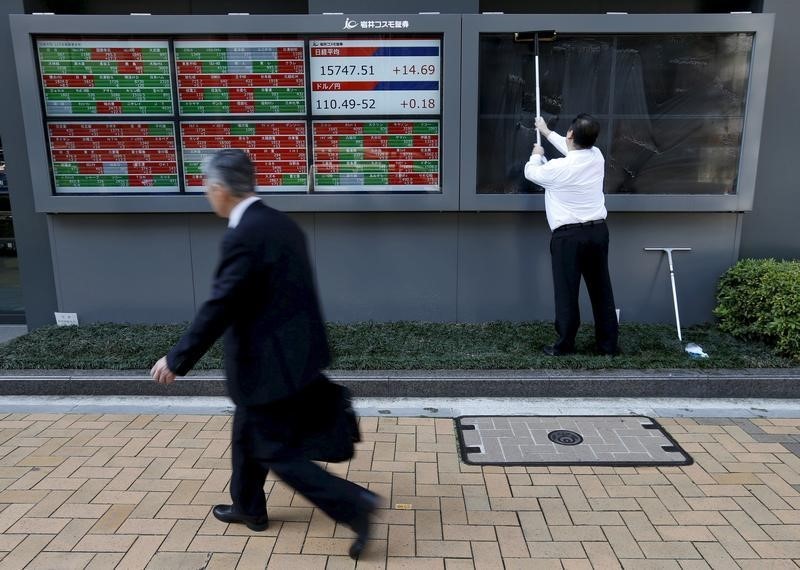By Marc Jones
LONDON (Reuters) - Shares made modest gains and the dollar lost ground against the yen on Tuesday as investors awaited the outcomes of Federal Reserve and Bank of Japan policy meetings that will conclude on Wednesday.
Nagging doubts about the firepower left available to top central banks and a slip in oil prices saw the pan-European STOXX 600 (STOXX) index dip in and out of the red after seven falls in the last 10 days. It was up 0.3 percent but the oil and gas sector slipped 0.7 percent (SXEP).
Wall Street was set for modest gains at the open, according to stock index futures (ESc1) (1YMc1).
Crude prices slipped after major producer Venezuela, mired in economic crisis, said oil markets were effectively 10 percent oversupplied. [O/R]
The yen
"Everybody is just waiting for the BOJ and the Fed – why do anything today?" said Commerzbank (DE:CBKG) currency strategist Esther Reichelt in Frankfurt.
"Everyone has already positioned for these events and there is no new information that could give them a reason to reposition."
The yen was changing hands at 101.91 per dollar <JPY=>. It has risen almost 20 percent over the past 12 months despite the BOJ's best efforts to weaken it. The euro <EUR=> was flat at $1.11750.
Sterling
"The noise on Brexit over the past week has given us more reason to sell any rallies," said Tobias Davis, head of corporate treasury sales at Western Union in London.
The pre-BOJ and Fed caution kept European bond market moves small too, although longer-dated euro zone government yields edged lower with the BOJ expected to try to lever investors away from its longer-maturity bonds.
The yield on 30-year German Bunds
Other euro zone bond yields also fell, if not quite so sharply. Germany's 10-year Bund <DE10YT=TWEB>, the region's benchmark bond, dropped 2.8 bps, turning back into negative territory, while Portugal saw a second day of outperformance.
British Prime Minister Theresa May met U.S. business chiefs from firms including Goldman Sachs (NYSE:GS), IBM (NYSE:IBM) and Amazon (NASDAQ:AMZN) on Monday in New York to try and reassure investors, while German leader Angela Merkel appeared rueful over the refugee crisis.
"If I could, I would turn back time by many, many years," Merkel said.
For Reuters new Live Markets blog on European and UK stock markets see reuters://realtime/verb=Open/url=http://emea1.apps.cp.extranet.thomsonreuters.biz/cms/?pageId=livemarkets
EMERGING DRAMA
While holding patterns predominated in major markets, plenty of action was on the cards in emerging ones.
Hungary's central bank was expected to stick to its unconventional easing policy following a surprise S&P upgrade to investment grade on Friday that has bolstered its high-flying stock (BUX) and bond markets and the forint (EURHUF=D3).
Nigeria, which in contrast was downgraded on Friday, also has a central bank meeting. A Reuters poll shows it is expected to stay on hold before hiking interest rates later in the year. Its finance minister, though, made a strident call for a cut on Monday.
In Asia overnight, MSCI's broadest index of Asia-Pacific shares outside Japan (MIAPJ0000PUS) slipped 0.1 percent.
Australian shares (AXJO) finished slightly higher. The Australian Securities Exchange opened without incident on Tuesday after technical faults caused extensive disruptions on Monday.
Japan's Nikkei (N225) erased its early gains to end 0.2 percent lower as trading resumed after a public holiday on Monday. Tokyo markets will also be closed on Thursday, with the BOJ meeting sandwiched in between.
Oil fell nearly 1 percent to $45.51 per barrel, having briefly rallied on Monday on Venezuela's bid to talk up a potential OPEC output freeze. That soon fizzled on indications that U.S. crude stockpiles had risen again last week. [O/R]
Gold <XAU=> though added 0.1 percent to $1,314 an ounce, on expectations that the Fed will stand pat on rates when it ends its two-day meeting on Wednesday. [GOL/]
